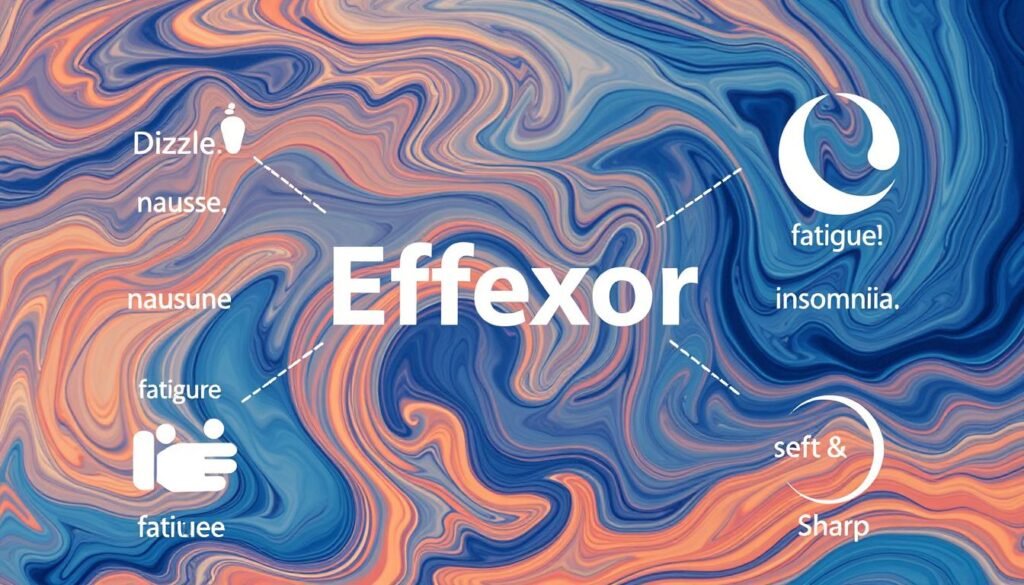Did you know about 40 million adults in the U.S have anxiety disorders? It’s the most common mental health issue here. Effexor, or venlafaxine, is a key player in anxiety management. Knowing when it starts working can really help those taking it.
Effexor is given for different mental health issues, like generalized anxiety and panic disorders. The medication effects can be felt in roughly a week or two. Yet, full anxiety relief often takes 4 to 8 weeks. This piece looks into how long Effexor takes to ease anxiety. It will help those considering it for their treatment. For more on this medication, do check Effexor for anxiety.
Key Takeaways
- Effexor (venlafaxine) is effective for managing anxiety disorders.
- Initial benefits may be felt in the first 1-2 weeks.
- It generally shows full effects in about 6-8 weeks.
- Common side effects include nausea, dizziness, and dry mouth.
- Getting the right dosage is key for the best results.
Understanding Effexor: An Overview
Effexor is known by its scientific name, venlafaxine. It is a popular antidepressant in the SNRI category. SNRIs help both serotonin and norepinephrine, important for mood and feelings. Effexor treats various anxiety disorders and depression too.
What is Effexor?
Effexor is approved by the FDA to help with mental health. It works for several anxiety and depression conditions. Users may feel tired or dizzy, affecting driving or using machines. The dose of Effexor varies, usually between 75 to 225 mg.
How Does Effexor Work for Anxiety?
Effexor helps reduce anxiety by boosting serotonin and norepinephrine in the brain. This stops these chemicals from being absorbed too quickly. As a result, symptoms like worry, trouble thinking, and muscle tension decrease. Usually, people start feeling better in a few weeks, but it takes longer for full effects.
Effexor and Its Role in Treating Anxiety Disorders
Effexor, known as venlafaxine, is key in treating various anxiety disorders. It is approved by the FDA for major conditions. These include major depressive disorder and others like panic disorder. People who don’t find typical antidepressants effective often benefit from Effexor.
Conditions Treated by Effexor
Effexor also helps with symptoms of other conditions, such as:
- Attention-deficit/hyperactivity disorder (ADHD)
- Obsessive-compulsive disorder (OCD)
- Post-traumatic stress disorder (PTSD)
- Premenstrual dysphoric disorder (PMDD)
- Migraine prevention
- Diabetic neuropathy
- Fibromyalgia
Its success in treating these issues is because Effexor affects important neurotransmitters. These include norepinephrine, dopamine, and serotonin.
How Effexor Compares to Other Antidepressants
Effexor stands out from other antidepressants in its side effects and how well it works. For many, it’s a good choice when SSRIs don’t help. Effexor comes as immediate-release and extended-release. Most people start with a dose of 75 mg a day. This may change based on how the person responds.
Studies show Effexor is effective in managing anxiety. It significantly helps with anxiety symptoms. Before trying Effexor, patients should talk about options with their doctors. This ensures the best treatment plan. For more on dosing, here’s a helpful resource.

How Long Does Effexor Take to Reduce Anxiety?
Knowing how long Effexor works can help set right goals. Effexor, or venlafaxine, treats anxiety well. How long it takes to work varies for each person.
Typical Treatment Duration
It often takes about 4 to 6 weeks to see Effexor effects. It’s key to take your medication regularly. Some see small benefits in 1 to 2 weeks. But waiting for full effects is crucial to manage anxiety relief well.
Initial Improvements and Full Effects
Early improvement signs can show in the first few weeks. This means the medicine is starting to work. Yet, big changes in anxiety can take around 6 weeks. The brain chemistry adjusts slowly, which helps treat anxiety better.

| Time Frame | Expected Outcomes |
|---|---|
| 1 to 2 Weeks | Initial improvements may start to appear. |
| 4 Weeks | Noticeable Effexor effects often emerge. |
| 6 Weeks | Full impact on anxiety symptoms typically realized. |
Factors Influencing the Speed of Relief
Effexor’s effectiveness in easing anxiety varies from person to person. The key factors affecting it include how much one takes and their unique reaction to it. Patients should know these facts to better plan their treatment.
Dosage Considerations
Doctors often start patients on a low dose of Effexor. They watch the patient’s reaction and any side effects carefully. They may increase the dose bit by bit. This could lead to better relief from anxiety.
It’s crucial for patients to talk often with their doctors. They should discuss any need to change the dose. This ensures the medicine meets their specific needs.
Individual Variability in Response
How quickly Effexor lessens anxiety depends on the person. Age, health, and past treatments affect this. Some might feel much less anxious in just a few weeks. For others, it could take longer.
It’s important for patients to understand their experience may be different. Being patient is often necessary as they adjust to the medicine.
Common Side Effects of Effexor
Effexor, also called venlafaxine XR, works well for anxiety. But it has side effects to look out for. Knowing the minor and major effects helps people make smart choices about using it.
Mild Side Effects
Mild side effects of Effexor often include:
- Dry mouth
- Dizziness
- Headaches
- Nausea
- Sweating
These symptoms usually start early on but get better with time. Drinking plenty of water and talking to your doctor can help.
Severe Side Effects to Watch For
Some people face tougher side effects that need quick doctor help. These include:
- Increased blood pressure
- Irregular heartbeat
- Suicidal thoughts or behaviors
- Serotonin syndrome
- Pneumonia or lung problems
Be extra careful in the first weeks, especially if under 24. Feeling too happy or too excited means you should see your doctor. Knowing these risks and having a plan is important. Find more on anxiety meds here.

Long-Term Use of Effexor for Anxiety Management
Effexor, also known as venlafaxine, is a key medication for anxiety control over time. It helps many people deal with anxiety, which impacts more than 30% of U.S. adults at some point. It’s important to know how long you can safely take this medication.
Safe Duration for Use
Doctors often say you should take Effexor for six to twelve months long-term, especially after feeling better. Continuing the treatment helps stop a comeback of symptoms and keeps your mental health steady. Everyone’s different, so staying in touch with your doctor to plan your treatment is key.
Tapering Off Effexor When Necessary
It’s crucial to slowly stop taking Effexor when it’s time, to lessen withdrawal symptoms. Stopping suddenly can cause problems like dizziness, feeling sick, and getting easily upset. Your healthcare provider should make a plan to taper off the medicine safely, reducing these risks.
| Withdrawal Symptoms | Duration |
|---|---|
| Dizziness | 1-2 weeks |
| Nausea | 1-2 weeks |
| Irritability | 1-3 weeks |
| Flu-like symptoms | 1-2 weeks |
| Insomnia | 1-3 weeks |
Potential Interactions with Other Medications
It’s key to understand how Effexor XR might affect other medicines you’re taking. This antidepressant can change how other drugs work. So, it’s vital to talk about all your current medications with your doctor. This can help make sure Effexor XR works well with other drugs.
Medications to Avoid While Taking Effexor
Certain drugs shouldn’t be mixed with Effexor XR. Be extra careful with these types:
- Monoamine oxidase inhibitors (MAOIs): Mixing these can cause serotonin syndrome, which is dangerous.
- Nonsteroidal anti-inflammatory drugs (NSAIDs): They can raise the risk of bleeding.
- Blood thinners: These also increase bleeding risks when taken with Effexor XR.
- Selective serotonin reuptake inhibitors (SSRIs): Using these at the same time can lead to serotonin syndrome.
- Supplements like tryptophan, 5-HTP, and St John’s wort: These might up the risk of serotonin syndrome, too.
Always check with your healthcare provider about any meds you’re taking. This includes over-the-counter drugs. People often ask about the safety of taking pain relievers, allergy medicines, and gabapentin with Effexor XR.
Importance of Discussing Current Medications with Your Doctor
Talking to your doctor about every medication you take is key. This can help avoid bad interactions and make sure your treatment works well. Doctors can check how well Effexor XR is working and look for side effects. Patients need to report any new symptoms like dizziness, appetite changes, or problems with sex. Keeping an open dialogue about your meds helps you safely manage your treatment.
Maintaining Mental Health While Using Effexor
Maintaining mental health with Effexor needs a well-rounded approach. It means regular check-ins with healthcare professionals. This ensures the treatment is right for individual needs.
Working closely with a professional helps in setting the right anxiety strategies. This is key in tracking how well the treatment works. Also, it’s important in fixing doses and handling side effects.
Monitoring Progress with Healthcare Providers
Seeing healthcare providers often helps keep an eye on how effective the treatment is. It allows making changes to the medicine dose when needed. This is due to health issues like kidney or liver problems.
This partnership is crucial. It makes sure the treatment keeps being helpful and safe.
Additional Strategies for Anxiety Management
Apart from medicine, there are other ways to fight anxiety:
- Cognitive-behavioral therapy (CBT): This is a key method to tackle anxiety symptoms.
- Lifestyle modifications: Adding exercise and good nutrition can boost mental health.
- Stress management techniques: Using mindfulness, meditation, and breathing exercises helps stabilize mental health.
Using these methods with Effexor can enhance results. It helps people live well despite anxiety issues.
Conclusion
Effexor is known to be effective for those dealing with anxiety disorders. Many feel better about their mood in just 1 to 2 weeks. But, it usually takes about 6 to 8 weeks to feel the full benefits. This shows why being patient during treatment is key.
People should keep track of how they’re feeling and talk to their doctors about any issues. This helps get the best results from the treatment.
Some common side effects include dry mouth and dizziness, but these usually get better with time. It’s important to find the right dose of Effexor for each person. Sometimes, genetic testing can help with this.
Effexor doesn’t just improve mood; it also reduces anxiety symptoms. Understanding its effects can help people make smart choices about their mental health care. For more info on how Effexor works over time, check out this resource.